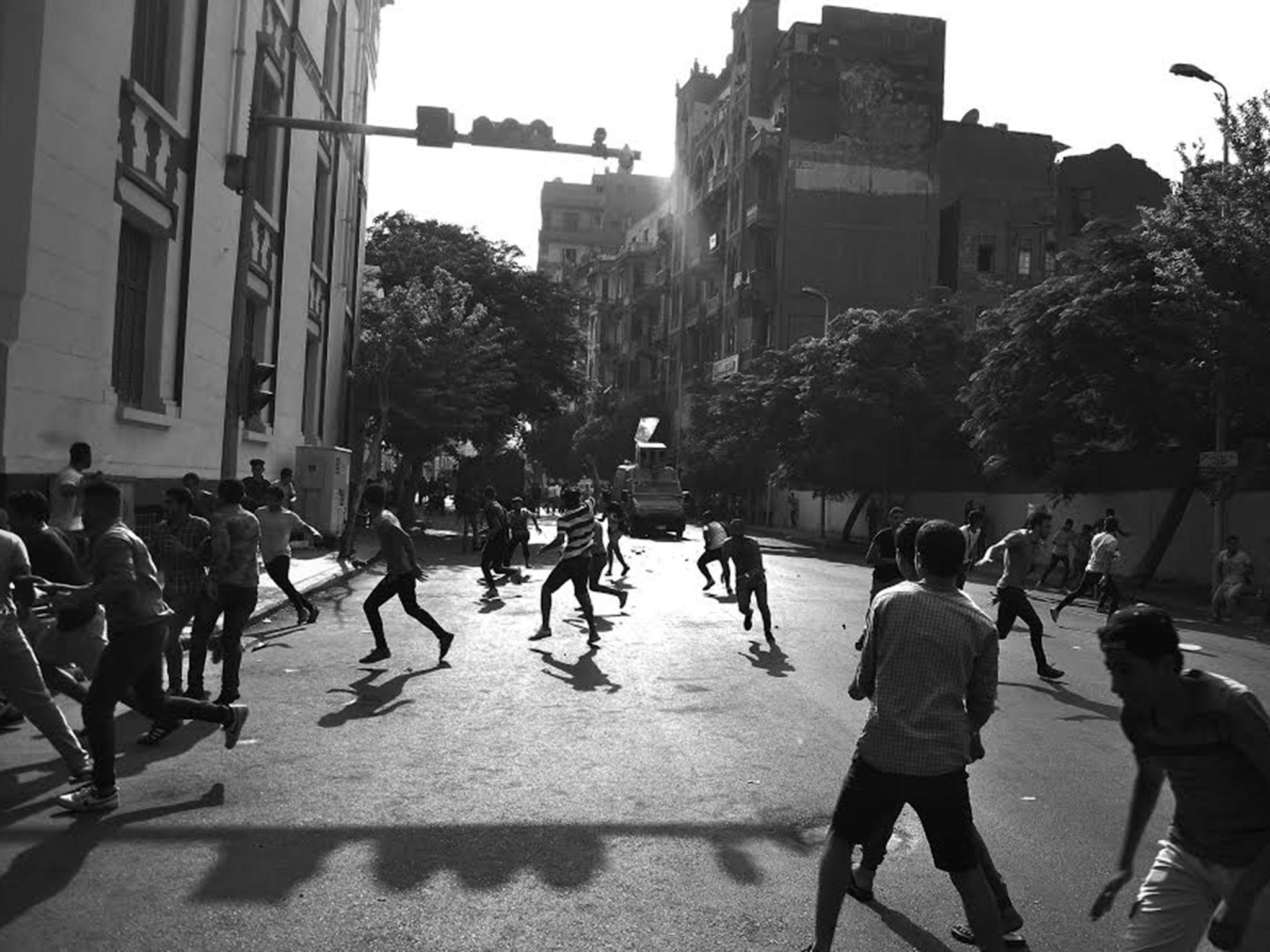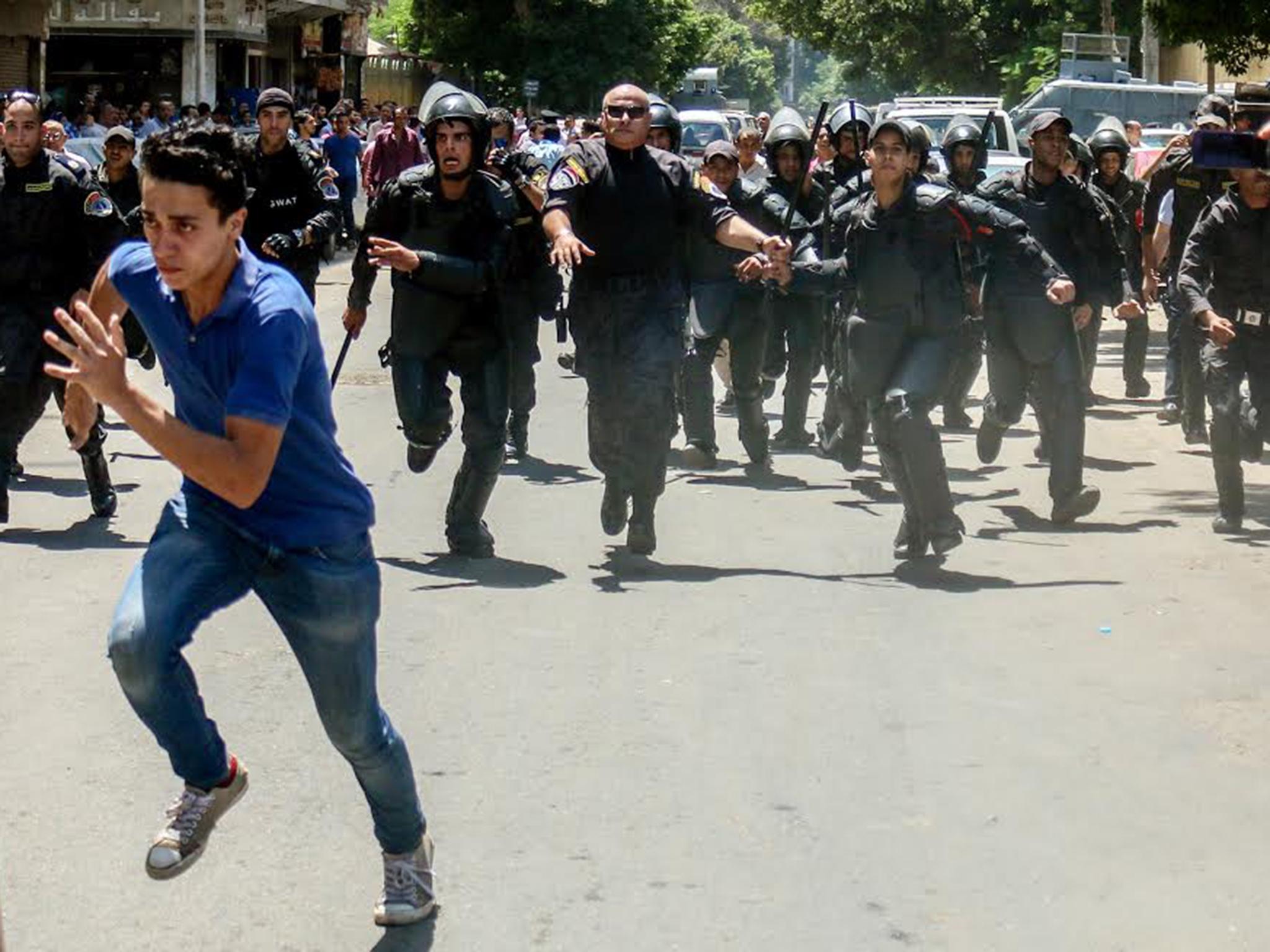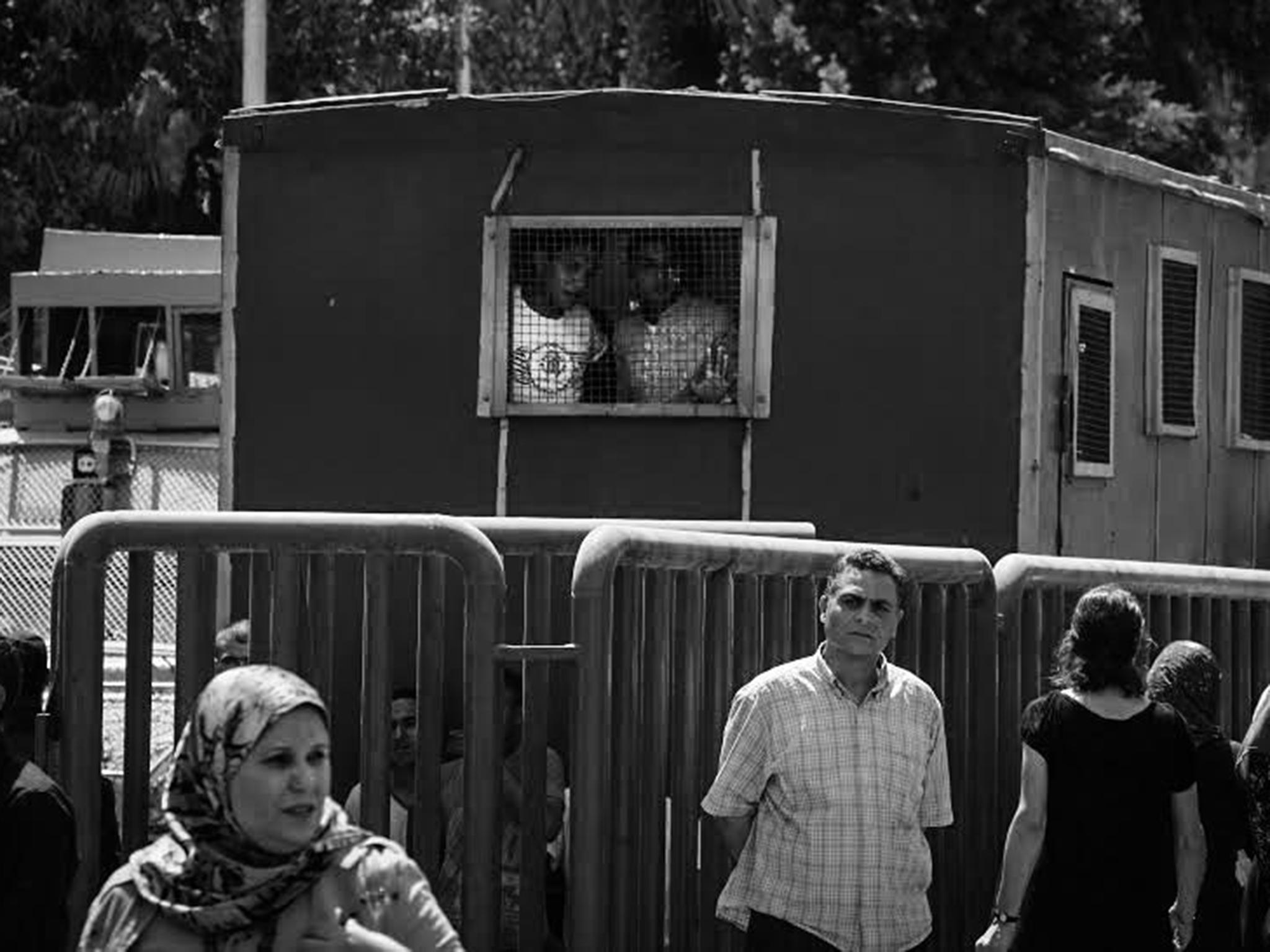Egypt's Year of Youth: how 'Generation Protest' became 'Generation Jail'

Your support helps us to tell the story
From reproductive rights to climate change to Big Tech, The Independent is on the ground when the story is developing. Whether it's investigating the financials of Elon Musk's pro-Trump PAC or producing our latest documentary, 'The A Word', which shines a light on the American women fighting for reproductive rights, we know how important it is to parse out the facts from the messaging.
At such a critical moment in US history, we need reporters on the ground. Your donation allows us to keep sending journalists to speak to both sides of the story.
The Independent is trusted by Americans across the entire political spectrum. And unlike many other quality news outlets, we choose not to lock Americans out of our reporting and analysis with paywalls. We believe quality journalism should be available to everyone, paid for by those who can afford it.
Your support makes all the difference.According to local media, Ziad Hassan Qenawy cried when he entered the courtroom. ‘I want to keep playing!’, he begged, as his father carried him on his shoulder to the dock. After the verdict, Qenawy told his lawyer ‘I want chocolate, and a Pepsi!’ His lawyer bought sweets for him from a nearby supermarket.
Qenawy is three years old. Last month, a Cairo court sentenced him to four years and three months in prison for theft and ‘resisting the authorities’. His lawyer appealed the conviction, and the case continues. In a recent court appearance, Qenawy entered the courtroom asleep on his lawyer’s shoulder.
Even by the recent standards of Egypt’s judiciary – this is the second time a toddler has stood trial in Cairo this year, though three-year-old Ahmed Mansour Qorani was fortunate enough to have his life sentence overturned in February – such a turn of events would be absurd enough, but 2016 was, by presidential decree, to be ‘the Year of Egypt’s Youth’.
In January, President Sisi promised a renewed focus on education and employment, as well as dialogue between his administration and the country’s restive younger generations. After nine months of this year, it’s not clear what Sisi’s promise has delivered. Instead, the futures of young Egyptians are being swallowed up by stifling, paranoid military rule.
Endemic corruption has wrecked an education system which now languishes 139th out of 140 countries for the quality of its secondary education, according to The World Economic Forum’s Global Competitiveness Report for 2015-16. Youth unemployment continues to run at more than 40 per cent. Theatres and libraries across Cairo face closure, or are already torn down, as the arts are suppressed in a bid to curtail dissent.
Waiting to be arrested
Yassin Mohamed is unremarkable among his generation. 21 years old, formerly a student, he has spent the last four years in and out of jail for his part in demonstrations, first against the presidency of Mohammed Morsi and then against military rule. In a video posted to Facebook last month, he described his life in the ‘Year of Youth’: “I was released by presidential pardon seven months ago, only to learn that I have been charged in another case. I have been on the run ever since.”

“I sit every day in my room in my prison uniform,” he says, “waiting to be arrested. I can’t live in Egypt, and I can’t leave,” the video continues. “Should I spend the rest of my life running? Or should I spend it in prison?”
Although Mohamed’s videos went viral across Egyptian social media, as an activist he was not a household name. A feature of 2016 has been the renewed effort to detain prominent activists around whose names and stories young Egyptians rally. One of those was 22-year-old Sanaa Seif, scion of a famous family of campaigners and rights lawyers. Also freed by presidential decree in late 2015, she was returned to jail within six months, convicted of ‘insulting the judiciary’.
Protests
Among those iconic figures, the leaders of the venerable April 6 Youth Movement are now the old guard. Formed in 2008, April 6 was nominated for a Nobel Prize in 2011 and outlawed in 2014. Its leaders were the core of what Amnesty once called ‘Generation Protest’ – now ‘Generation Jail’.
Until this year, Zizo Abdo, 33, a rally organiser and sloganeer for April 6 since 2008, was one of the last free members of that generation and a hero to Egypt’s young activists. He was arrested on 15 April, following protests against Sisi’s ‘gift’ to Saudi Arabia of the strategically important Red Sea islands Tiran and Sanafir. ‘They questioned me for 12 hours. As I left, a policeman called after me, “Zizo! I’ll bring you back soon!”’
A week later, Abdo met his friend, rights lawyer Malek Adly, for coffee. At the time of writing, that meeting was Abdo’s last action as a free man.

From his cell, Abdo remembers the moment, leaving the cafe, when “four private cars surrounded us. Men in civilian clothes circled us, pointing guns at us. They attacked us, started beating us. I was pistol-whipped across the back of the head, and pushed inside one of the vehicles. They blindfolded me, and the car began to move.”
Now, Abdo appears before a judge every15 days to renew his pre-trial detention. Last month, a judge asked him, “why are you still here? There is nothing to connect you to any of these crimes”. Nevertheless, Abdo was returned to prison, to a cell he calls “the Refrigerator”. His friends blame the state security service, the SSI, for intervening in the legal process.
Malek Adly previously described the role of the courts under the military government as “to ensure citizens’ oppression... and to make this injustice look like robust legal procedure”. After two months in solitary confinement, during which time, according to his wife, prison authorities refused him a bed, Adly was released on bail in late August.
Corruption
A new generation of protesters, secondary school students, came to prominence during June’s summer exam period, emboldened by the Ministry of Education’s embarrassing game of cat and mouse with an online persona known only as ‘Chao Ming’.
Operating through social media, Chao Ming caused the cancellation or postponement of a string of Egypt’s final secondary school exams, which ran throughout June, by leaking test scripts and answers before or during the exams.
Whoever is behind the Chao Ming identity, they are driven by frustration at corruption and cronyism within Egypt’s education system. Chao Ming has publically called Egypt’s education system “absurd”, and is demanding improved pay for teachers and a sweeping overhaul of the national curriculum: “until I see improvement in the education system, the leaks will continue”.
Predictably, the first response of the military administration was a wave of arrests, of students and ministry officials. That was in early June – but the leaks have continued. “I feel sorry for the people they have arrested”, read a somewhat cryptic Facebook post, “but I’ve said it before: you can’t arrest me. I don’t live in Egypt. Chao Ming is an idea, and ideas never die”.
Frustrated by the government’s inability to secure its own exam system, hundreds of students protested outside the Ministry of Education in July. Security services dispersed the gathering with tear gas and rubber bullets. As of August, Chao Ming is inviting students across the country to make contact via Facebook for preview copies of the forthcoming ‘supplementary exams’.
One organisation filling the gaps in Egypt’s broken education system is the Al-Karama Libraries Initiative. Through five free libraries, located in some of Cairo’s poorest suburbs, Al-Karama offers books, internet access, educational resources and exhibitions, guided by the principle that “a well-informed and educated person has the ability to understand and defend his rights, and to help develop his community”.
The initiative’s flagship Khatwa Library, opened in the suburb of Dar al Salam in 2012, holds training sessions in creative writing and photography, and has sponsored both art exhibitions and publications by local youths. It should come as no surprise, then, that in the ‘Year of Youth’, the regime’s moves against a prominent human rights activist, Gamal Eid, could cause the closure of Khatwa, and the initiative’s other four libraries.
In 2011, the Roland Berger Foundation named Eid, head of the Arabic Network for Human Rights Information (ANHRI), the winner of their Human Dignity Award. The award comes with prize money of EUR330,000 – money which was used to launch and maintain the Al-Karama Initiative.
Earlier this year, Egypt’s judiciary reopened 2011’s notorious ‘civil society case’, which accuses a number of human rights NGOs within the country of “illegally receiving foreign funding”. The prize money with which Eid opened five free-to-use libraries across Cairo is now the focus of the public prosecutor, and should the seizure of Eid’s assets be confirmed by a Cairo court later this month, the Al-Karama libraries face closure.
Cultural Damage
“The people have lost faith in the government’s promise,” laments Ali Quandil, an actor and comedian who campaigns for the reopening of theatres and cultural centres across Egypt. “They don’t think the government will deliver.” With a smile, Quandil adds: “But I’m still waiting.”
The promise in question was the gift of the abandoned Fardaws Theatre in central Cairo. “It’s an old building, abandoned for years. I told them I could have it operational in 24 hours, and officials promised me I could get started in a week – that was two years ago. They said the President himself signed my application! Then I never heard from them again.”
Diplomatically, Quandil suggests that the government seem to be “unaware of the value of theatre, or its importance to young people”, but this mothballing is the regime’s attempt to stifle dissent, regardless of the lasting cultural damage it entails.
“We have plenty of groups willing to perform, but they don’t have a stage,” he says. “We have an audience, but again, there are no shows anymore.” What performances do remain are strictly vetted for partisan content. The demolition in June of one of Cairo’s most iconic theatres, El-Salam, is testament to a collapse in performing arts across the capital, and the country.
While libraries face closure and famous theatres lie abandoned, awaiting demolition, Sisi has ordered the construction of twelve new prisons since coming to power in 2014. For now, at least, the military administration is happier making gifts to foreign powers than to its own citizens.
In April, Sisi met with members of Egypt’s National Council for Women to discuss plans for the ‘Year of Egyptian Women’ in 2017. The following month, prominent female activist Mozn Hassan was banned from leaving the country amidst investigations by the state into Nazra, the women’s rights organisation she heads. If the ‘Year of Youth’ is any kind of blueprint, Egypt’s women should brace themselves for a challenging time ahead.
Join our commenting forum
Join thought-provoking conversations, follow other Independent readers and see their replies
Comments